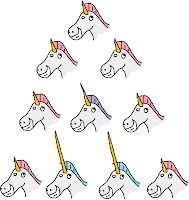Pascal's Triangle has got to be one of the most useful things in the history of useful things. To give some perspective on just how many applications it has, keep in mind: I was learning about Pascal's Triangle in my first year 7 maths lesson and my last HSC Extension 2 maths lesson. Triangles don't get any more diverse than Pascal's.
For those of you who either don't know or can't remember what Pascal's Triangle is, it's a pretty simple mathematical... toy, I guess you'd call it. Or maybe you wouldn't, but I would. Pascal's Triangle is a toy, and like all the best toys, it's easily constructed and useful for all your life, ever, forever, like Lego. Pascal's Triangle is created by starting with the number 1 at the top of the triangle. The next line is the sum of the two numbers directly above it. So 1 and 1. And then then next line will be 1, 2, and 1. And so on:
1
1 1
1 2 1
1 3 3 1
1 4 6 4 1
1 5 10 10 5 1
1 6 15 20 15 6 1
1 7 21 35 35 21 7 1
There are the first eight lines for you, just to get you started. You'll soon discover why I chose eight lines, but now it's time to do cool, improbable stuff with it!
For starters, look at the second (or second last) number on each line. You'll notice it has the pattern 1, 2, 3, 4, 5, 6, etc. It just counts. Which is obvious, really, because you'll be adding 1 to it each time, but it still looks cool. You know what else looks cool?
Sierpinski's Triangle.
Sierpinski's Triangle is what happened when Nintendo realised what a goldmine they were sitting on with the Legend of Zelda series. Shigeru Miyamoto drew a Triforce. In each of those Triforces, he drew another Triforce. And then another. And another. And another, until he had such a cool looking pattern that you didn't even notice that I've already begun eight sentences with conjunctions this blog post.
So that's cool, now we have two funky looking triangles. But (nine) what's that all about? The cool thing is, if you colour in all the odd numbers in your Pascal's Triangle, guess what you end up with?
1
1 1
1 2 1
1 3 3 1
1 4 6 4 1
1 5 10 10 5 1
1 6 15 20 15 6 1
1 7 21 35 35 21 7 1
Sierpinski's Triangle, aka Pascal's Triforce. I just ended a sentence with a preposition and I don't even care. That's how exciting this is. I am throwing grammar to the winds and mathsing this right up now, because it only gets better.
Some of you probably now realise why I had eight lines. Eight lines is the perfect amount to demonstrate a Pascal's Triforce. Four would be perfect to show off just a normal triangle, since the fourth line is comprised entirely of odd numbers, like the eighth. Also like the first and second.
1, 2, 4, 8... check it out, you guys, the next time this happens will be line 16! Computer scientists and maths nerds will recognise this pattern immediately as being 2^0, 2^1, 2^2, 2^3, etc., and normal people will put it more succinctly as "it doubles each time". This is officially whacky!
"This is cool and all," I can hear you saying, "but that isn't quantum mechanics, and frankly, there's only so much of a maths lesson you can give me before you get really boring really quickly." Well, let me tell you: you're right! That isn't quantum mechanics. Also, you're wrong. You can never have too much of a maths lesson. But (ten) ignoring what is actually my favourite use of Pascal's Triangle (i.e. binomial expansion, exciting, right?), let's move on to what I actually learnt today.
Nuclear Magnetic Resonance! It's a lot of fun and useful for determining different things about different chemical structures, but that's not the point. The point is that if one faerie is near another faerie, it creates a unicorn not only for itself but one for its friend faerie, too. If there is a third faerie nearby, they will channel their magical power and there will be two normal unicorns, and one unicorn with a horn twice as long as the other unicorns. If there is a fourth faerie, then there will be two normal unicorns, and two unicorns with horns three times as long as a normal unicorn's!
Do you see where I'm going with this?

Obviously, this example is imperfect, since by 'faerie' I mean 'proton' and by 'unicorn horn' I mean 'spike in the NMR reading due to spin-spin couplings which are pretty much quantum entanglement', but I think most people probably understand this example a lot better. Maybe you don't? The beautiful thing is, you don't really have to understand what's going on there.
Today I learnt that Pascal's Triangle has applications in quantum mechanics, and spent the rest of my chemistry lecture fixated on that rather than on what they were.
Other interesting things I learnt today:
- River deltas are called deltas because they resemble an uppercase letter delta
- The velvet on an antler supplies the growing bone with blood and nutrients
- "It [chemically equivalent spin couplings] is like boy and girl fall in love. When you in love, you not have two horns on your head each." That's the only other thing I took out of that lecture.

























